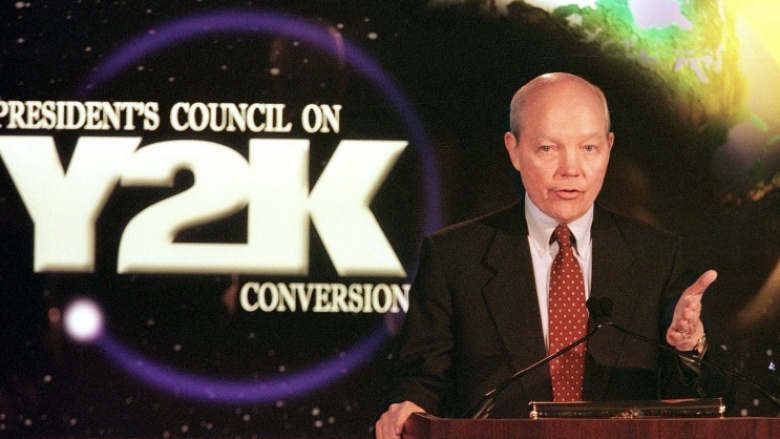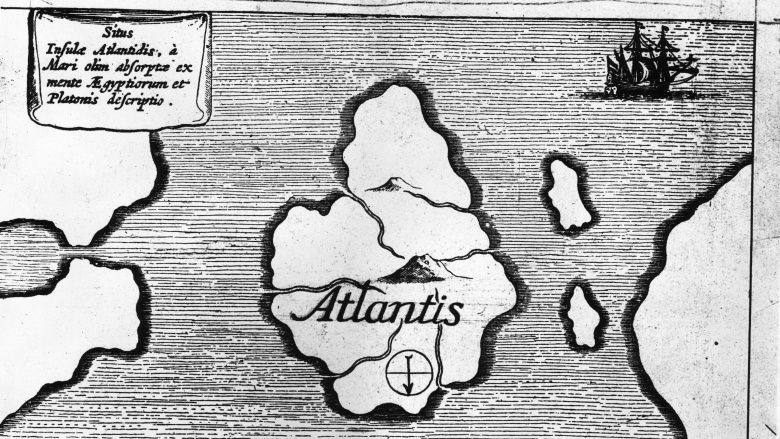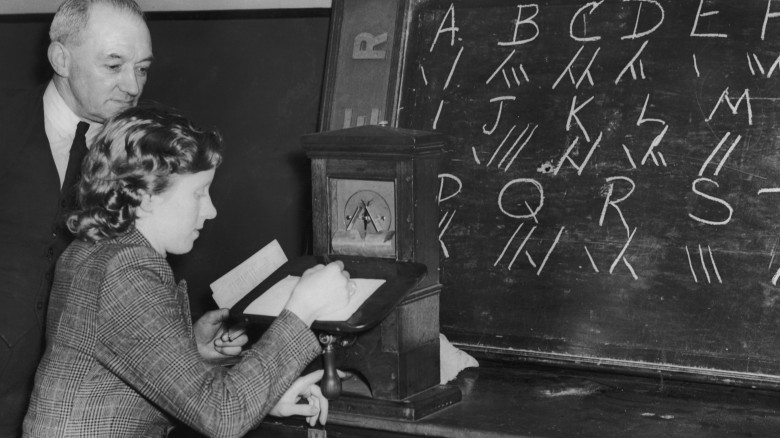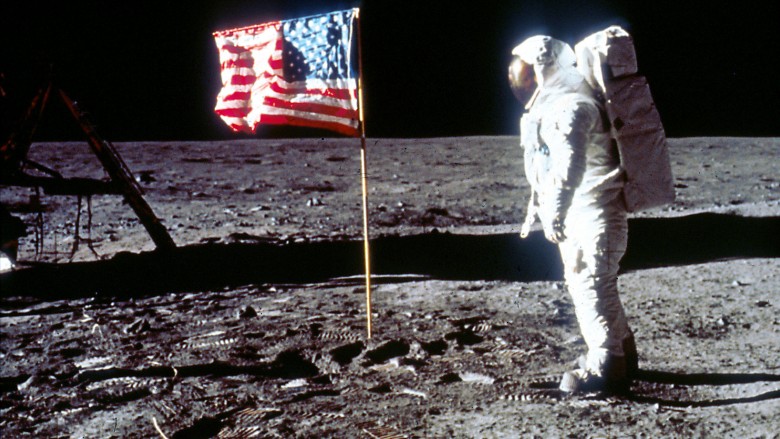False Facts About The Future That Never Came True
Clairvoyance may be a gift possessed by some, but more often than not, life-altering doomsday predictions don't pan out. With thousands of followers, these false forecasters are often left scrambling for some excuse or reasoning that could have delayed what they believe to be inevitable. Anything to extend their 15 minutes of fame and save a little face. With many of these claims being outlandish and quite far-fetched, it's hard to believe anyone would give them a second thought, let alone give them enough attention to cause a fuss.
Al Gore's hurricane predictions
In 2006 Al Gore shocked the world with his documentary An Inconvenient Truth on climate change and the potential shocking effects it could have on our planet. Even if you haven't seen the film, it's likely you've heard of many of his predictions. The documentary put a ton of precautionary measures in motion. This point of no return Gore brought to the world's attention included the prediction that the warming of oceans would create more frequent and more intense hurricanes in the Atlantic Ocean, a flow of freshwater into the North Atlantic will cause the ocean conveyor belt to shut down, and warmer weather will provide the Arctic with its first ice-free summer.
Within the ten years since this video was released, many scientists have examined the claims in the film, concluding that some of his predictions are extremely unlikely or will take many years to occur. In an article written for Science News, Thomas Summer points out that Gore's prediction that warmer weather will cause more hurricanes of stronger velocity hasn't with evidence from scientists that have found that the number of annual storms has actually decreased over the last century, making Gore's prediction quite false. It was thought that hurricanes over the ocean were caused by the water being warmer than the surrounding air, and with the gradual increase of the Earth's temperature, it's not unreasonable that there would be more hurricanes. However, scientists have concluded that the formation of a hurricane isn't necessarily so cut and dry and that this false conclusion came from data that only went back to 1961. The explanation behind the decrease of major storms might be caused by climate change after all, though, as scientists believe warmer air temperatures have increased the variation in wind speed at different elevations, which actually prevent hurricanes from forming. So maybe not all effects of climate change are negative.
Y2K will cause worldwide blackouts
Few people can say they've experienced the turn of a century, so it's understandable that in 1999 people were unsure what to expect when midnight approached on the first day of the new millennium. At the time, computers processed the year using the last two digits meaning the year 2000 would be 00, the same as the year 1900. Many believed this would cause computers to crash, major networks to fail, and blackouts all over the world, putting an end to the technology era.
Understandably, these predictions caused a major freakout among believers. The government spent billions of dollars to rectify this "problem," and insurance companies began selling Y2K plans which would be conveniently stored in their failed computer networks if these predictions panned out. People built bunkers like it was the '50s and the Cold War was in full steam. They stocked up on canned goods and prepared for the worst, but as we all know, nothing happened.
May 21, 2011, would bring the rapture and the end of the world
Harold Camping was a well-known radio broadcaster who lured listeners into his show by predicting the end of the world. As he ran a Christian-themed show, his prediction of the rapture targeted just the right people for him to get a large following. Believers and Camping himself were convinced that on May 21, 2011, Jesus would rise for the rapture, taking those who deserved to be saved up to heaven while the rest of us were left to suffer plagues that would overcome the earth for five months afterward.
Camping explained how he came to his conclusion by taking the date Jesus was hung on the cross and using a bunch of nonsense math equations that literally mean nothing until he came up with the date. As an owner of Family Radio, which is based in California, he was able to spread the world quickly. Many believers sold all of their belongings in preparation for this date. When it didn't happen, Camping blamed a few mathematical errors and changed doomsday to a date later that year in October. After the rapture failed to happen a second time, many believers were left broke and emotionally destroyed. Camping apologized for being wrong and kept quiet for the remaining two years of his life, but he will be remembered for a long time as one of the most famous cases of a failed end-times prediction.
Air pollution will cut Earth's sunlight in half
According to Life magazine's January 1970 issue, air pollution was supposed to have reduced the amount of sunlight reaching Earth by half before 1985. While the article didn't go into much detail explaining how they come about this prediction, it was written that scientists had solid evidence to back it up. The magazine did however, go into the detrimental effects that could occur as a result of this and several other environmental catastrophes they predicted. Likely the article was published as more of an environmental awareness campaign to encourage people to contribute to a cause rather than fix the problem, and we're all fortunate enough to not have to sit around in the dark all day.
The polar ice caps will melt and create mass flooding
In 1972, Arctic specialist Bernt Balchen claimed that the polar ice caps would melt and an ice-free Arctic Ocean would develop by the year 2000. Reported in The Tuscaloosa News, Balchen said this would be a positive result of climate change, after the melting ice caps resulted in mass flooding that destroyed shorelines, as the melted ice would open up ocean trade routes for the United States. "The gradual change in climate, Balchen (said), eventually may make possible tanker shipment of oil from Alaskan and Canadian fields, and pave the way for water transport of the Far North's mineral wealth of uranium, nickel, iron, lead, and zinc." Fortunately for those who live on the coasts, this prediction failed to occur. For now at least.
Earth will run out of oil and other natural resources
It's hard to say who started the rumor that the Earth is running low on oil and other natural resources, but it seems to make sense that if you use something regularly that it will eventually run out. However, it hasn't happened yet in the case of oil.
Take it with a grain of salt considering the source, but oil tycoon BP has claimed that global reserves will nearly double by the year 2050. The BP Group's head of technology, David Eyton, said the following: "When taking into account all accessible forms of energy, including nuclear, wind and solar, there are enough resources to meet 20 times what the world will need over that period." It seems there should be little concern for running out of oil and gas when there are plenty of other energy resources available to us. Additionally, by using certain chemicals, super computers, and robotics, gas and oil companies have been able to squeeze every last drop out of existing reservoirs, providing plenty of time for vehicles to be manufactured using additional forms of energy resources.
The alignment of the planets would end the world
German astrologer Johannes Stoeffler predicted that the world would end on February 20, 1524 after the alignment of the planets would lead to floods so great that they would destroy the world. As a recognized employee at a well-known university, Stoeffler's prediction was trusted, and he gained tons of followers. Pamphlets were handed out, and panic quickly ensued. Hundreds of believers even went on to build themselves wooden arks and launch them onto the Rhine, hoping to survive the floods. One German nobleman, Count von Iggleheim, even built himself a three-story ark.
Strangely enough, a major thunderstorm struck the area on that day, convincing the doubters that Stoeffler's theory was coming true. Many of those who hadn't prepared for the flood attempted to swim to the arks where Stoeffler's followers were on board calmly anticipating the end of the world. Whether due to their panic, the rough ocean waves caused by the storm, or their sheer lack of swimming skills, hundreds of people drowned that day after failing to reach the arks.
Atlantis will rise and destroy the Caribbean Islands
Retired psychology professor Charles Spiegel predicted that the long-lost city of Atlantis would rise from the sea in 2001, essentially flooding and destroying the Caribbean Islands. Like many other academics who chose to make predictions about the future, Spiegel was obsessed with the discovery a rising of Atlantis. He'd preach his expectations in a small town near San Diego, providing little or no proof of his beliefs.
Adding more strangeness to an already odd theory, he also predicted that soon after Atlantis rose and destroyed one of the world's best vacation spots, a group of aliens called Myton would land on Earth. There was no need to panic, though, as these aliens wouldn't be invading the planet with the intention of taking over Earth or be abducting people for human experimentation. According to Spiegel, these Myton aliens would arrive in order to enlighten humans with their knowledge and expand the minds of the human race. Unfortunately for believers, none of what he predicted happened. Atlantis remains under the sea and the Mytons remain on their home planet, wherever that may be.
The letters C, X, and Q would be removed from the alphabet
Back in 1901, Ladies Home Journal released an issue containing an article that listed nearly three dozen or so predictions that were expected to occur over the next hundred years. The article has since made a second wave online as many of the article's predictions have actually come true. One that most certainly has not, however, concerns the predicted disappearance of the letters C, X, and Q from the alphabet.
Why make such a ludicrous declaration? Well, according to the Journal, those letters were thought to be "unnecessary," and newspapers would soon begin to spell words based on sound. While our alphabet remains intact, and newspapers aren't exactly encouraging their writers to take spelling shortcuts, a trend has certainly taken over other aspects of our communication. While there's no way that, in 1901, anyone could have predicted that the young whippersnappers of the world would be creating their own language through instant messaging, text, and social media, these shortcuts are technically spelling by sound. For example, we often use "u" rather than "you," or "r" instead of "are," but this language alteration has yet to become accepted by professionals and publications. All 26 letters are safe ... for now. We an never tell eatly what the future shall bring.
A shorter work week
In 1950, the Associated Press released an article about how experts thought the world would be living in the year 2000. Some of their predictions are on point, but others simply didn't pan out. Unfortunately for anyone stuck in the 9-to-5 daily grind, the prediction that we'd all see a significantly shorter regulated work week before the turn of the century has not only failed to come true, but seems to have spun in the opposite direction.
The experts consulted by AP seemed to think that, since labor was built from nothing over the past fifty years, "it is likely to win greater acceptance from other elements of American life. This in itself would tend to eliminate some of the great labor-management struggles and create a smoother-working American team." So basically, this "expert" thought that, as a result of gaining the respect of Americans and American lawmakers, workaday Joes and Janes would finally catch a break. Boy were they wrong.
To give this expert some credit, their prediction didn't seem so far-fetched when it was published, as child labor laws, minimum wage, unemployment compensation, and regulated work weeks were new laws. Why not reduce the work week after development has capped out, then? It would make sense but, unfortunately, many companies focus on working longer and harder, rather than encouraging employees to work smarter.
Example: after claims that they encouraged their employees to work 80-hour weeks, Amazon offered a select few of their employees a 30-hour week as a trial program, one that came with all of the same benefits as those who worked 40 hours or more. Naturally, there was a price to pay ... literally. These employees got to spend less time in the office, but they also were paid less 25 percent less. That's likely to be the only way the average work week shortens — if we agree to get paid less in exchange for more time eating lunch at home while watching The Price is Right.
Space travel for all
Feel like spending Spring Break on Mars? Or how about spending the holidays on the Moon? According to the Kentucky New Era newspaper in 1952, this should be possible by now. The paper reported on that year's International Congress of Astronautics event, an annual meeting of the world's greatest scientists. Among the many predictions made by these renowned scientists was the assumption that space travel would soon not only be possible for us regular folk, but there would be regularly scheduled trips to other planets for our traveling pleasure.
For this to happen, however, we would first have to put "earth moons" into orbit. At least, that's what these scientists claimed. The article reads, "the first step toward true space navigation were ... man-made satellites high in the earth's atmosphere. Persons stationed on these earth moons continuously circulating around the world, will be able to observe and report any unusual activity ..." It was from these satellites that these spaceships were thought to be leaving from but, as we all know, no one's planning trips to space these days other than astronauts and extraterrestrial enthusiasts. Maybe if somebody opened a McDonald's on Mars, people would be more excited to chill out there.
Flying cars
In 1964, the New York World's Fair was the place to be for tech geeks, enthusiasts, and the everyday user, as it demonstrated the advances made in the industry since the turn of the century. This showcase of all that had been accomplished in just sixty years inspired some to look at the possibilities for the future, and predict where they thought technology would go from there. Isaac Asimov of the New York Times made a few predictions of his own in his 1964 article that reported on the fair, — being that the man wrote about the future for a living, it's not too shocking that he got a lot of it right. Well, except this one:
Asimov predicted we'd all be zipping around in flying cars by 2014, using jets full of compressed air to lift vehicles off the ground. Like a scene right out of The Fifth Element, these flying cars would significantly reduce pavement upkeep and completely eliminate the need for bridges, since these vehicles would be able to glide over water as well.
Well, 2014's come and gone — are you enjoying your flying car? Of course not. In theory, flying vehicles sound pretty awesome but, in actuality, they would be a disaster for the economy. The transition alone would take decades, while other means of transportation, like trains and planes, would become obsolete. There's no need to spend a ton of money on plane tickets when you can just pile the kids in the van and fly yourself to Disney World. We're going to say the airplane industry has less than zero intent on letting that happen, so for now, if you want for flying car fix, find yourself some Jetsons clips on YouTube.
Humans will be inhabiting and mining on the moon
In 1982, people were making careers out of being a professional futurist. Barbara Hubbard was one such "pay me to predict the future" person, and during an interview for the New York Times, she revealed several of her predictions for the year 2000. "We are going to cultivate the stars," she claimed, thinking people would be inhabiting the Moon and any asteroids in our solar system, in order to mine them for materials.
What exactly did this Hubbard believe we'd need to do to get going with our Moon-living? Well, she answered a question with another question: "Can the infantile species take its mind off of destruction and concentrate on construction?” In short, we'll only get this done when we stop killing and warring? Kind of harsh, Barbara. Not to mention naive.
What's worse is, according to her, if we don't focus on construction then apparently, "... we will be a retarded planet." So, on top of getting the whole "live on dead space rocks" thing dead wrong, it looks like she couldn't predict that using the term "retarded" wouldn't be politically correct at the turn of the century.













